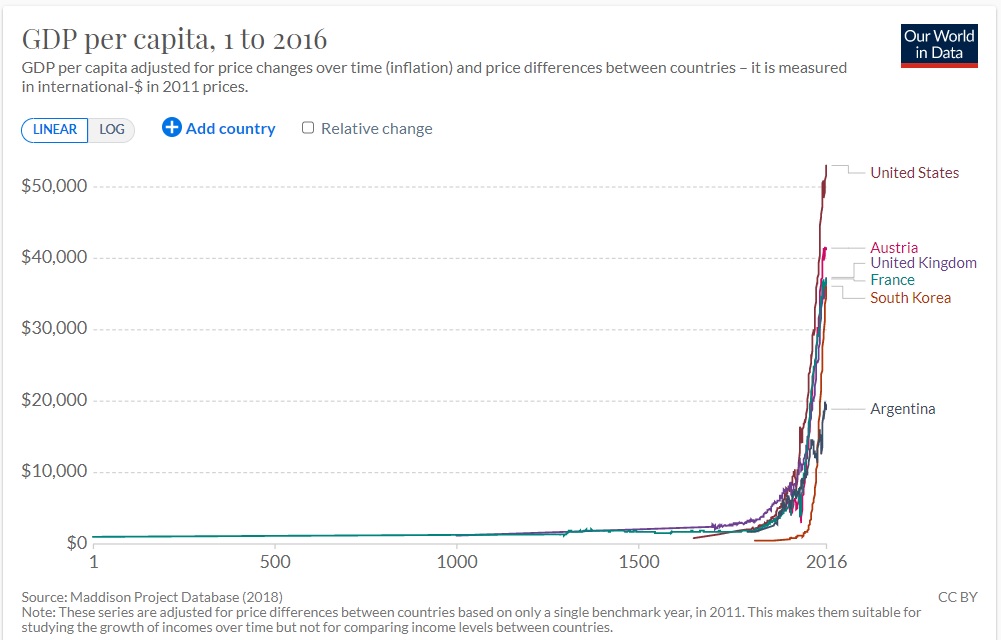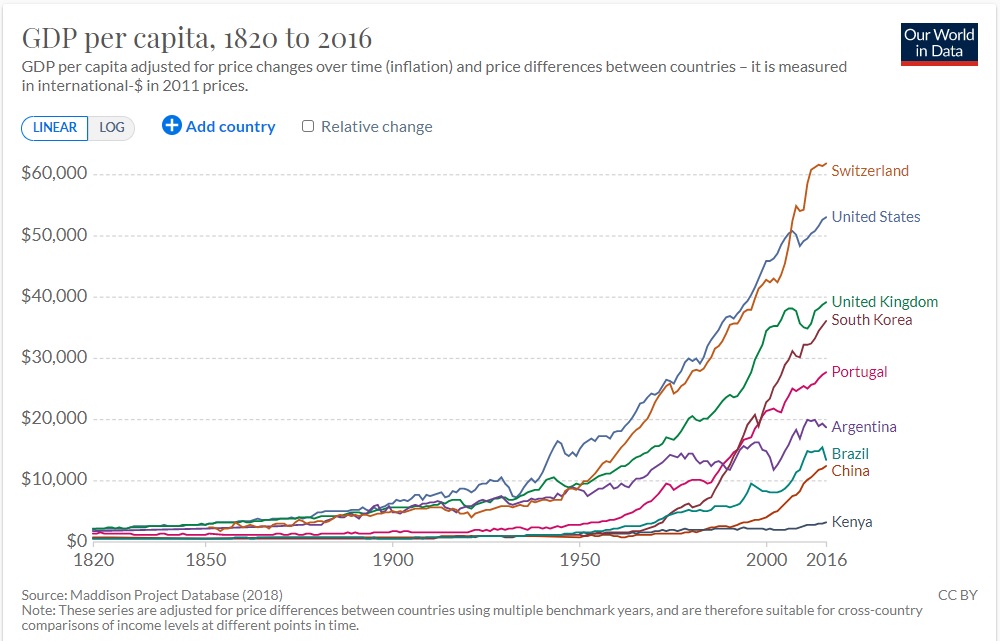Back in 2014, I shared two videos, one narrated by Prof. Don Boudreaux and the other narrated by Prof. Deirdre McCloskey, making the point that grinding poverty and material deprivation were the norm for most of human history. It wasn’t until capitalism emerged a few hundred years ago that we made the jump from agricultural poverty to industrial prosperity.
I know at least one person who didn’t watch those videos.
Congresswoman Ayanna Pressley isn’t as well known as other members the “The Squad,” especially Alexandria Ocasio-Cortez and Ilhan Omar (jointly featured in this bit of satire), but she deserves some sort of recognition for being totally clueless about economics and history. Indeed, she may even deserve some sort of prize for uttering the year’s most economically illiterate sentence.
The two aforementioned videos illustrate why her statement is nonsensical, but let’s share some updated numbers to illustrate why she is profoundly wrong.
The Our World in Data site, maintained by Max Roser at Oxford University, is a great resource for researchers. If you go to the section on economic growth, you’ll find lots of information and many charts examining what has happened to living standards over long periods of time.
For instance, here’s a look at gross domestic product (GDP) over the past 2000 years. As you can see, per-capita economic output was very low (and very flat) until capitalism emerged in the 1700s and 1800s.
Thanks to capitalism’s emergence (along with the rule of law), we are vastly better off today than our ancestors.
Here’s another look at the data, but let’s focus on just the past 200 years. Yes, the 1800s was the era of the “industrial revolution” and so-called sweatshops, but that was a building block to our current prosperity.
To be fair to Congresswoman Pressley, it’s only the first part of her statement (“poverty is not naturally occurring”) that is grossly inaccurate and economically illiterate.
She then added that poverty “is a policy choice,” presumably because she wants people to believe that more redistribution can make it go away. That part of her statement also is wrong, according to both U.S. data and global data, but not quite as ludicrously erroneous.



[…] As you might expect, some of the most economically illiterate members of Congress signed the letter, including Bernie Sanders, Elizabeth Warren, Alexandria Ocasio-Cortez, and Ayanna Pressley. […]
[…] at Oxford, this time looking at the past 200 years. Lo and behold, we see how living standards began to skyrocket as capitalism took […]
[…] at Oxford, this time looking at the past 200 years. Lo and behold, we see how living standards began to skyrocket as capitalism took […]
[…] this chart from Oxford University’s Our World in Data. As you can see, per-capita GDP increased sharply in the latter part of the 19th century (the period most associated with “robber barons” […]
[…] with this chart from Oxford University’s Our World in Data. As you can see, per-capita GDP increased sharply in the latter part of the 19th century (the period most associated with “robber barons” […]
[…] take a look at this chart, which I also first shared earlier this year. It shows that the increase in living standards has been even more dramatic if you look at changes […]
[…] take a look at this chart, which I also first shared earlier this year. It shows that the increase in living standards has been even more dramatic if you look at changes […]
[…] take a look at this chart, which I also first shared earlier this year. It shows that the increase in living standards has been even more dramatic if you look at changes […]
[…] take a look at this chart, which I also first shared earlier this year. It shows that the increase in living standards has been even more dramatic if you look at changes […]
[…] the case for capitalism (Part I, Part II, Part III, Part IV, Part V, and Part VI), and I’ve shared lots of long-run datashowing how some peoplebegan to enjoy unimaginable prosperity as capitalism emerged and monarchism, […]
[…] case for capitalism (Part I, Part II, Part III, Part IV, Part V, and Part VI), and I’ve shared lots of long-run data showing how some people began to enjoy unimaginable prosperity as capitalism emerged and […]
[…] last half of the interview. I point out that a handful of nations began to escape poverty, largely back in the 1800s, when the fiscal burden of government was very […]
[…] is an issue I’ve repeatedly addressed, showing how poverty was the natural state of humanity until capitalism appeared a few hundred years […]
[…] is an issue I’ve repeatedly addressed, showing how poverty was the natural state of humanity until capitalism appeared a few hundred years […]
[…] most of human history, we’ve had primitive and impoverished societies based on feudalism and […]
[…] most of human history, we’ve had primitive and impoverished societies based on feudalism and […]
[…] video notes that poverty was the natural condition for humanity (notwithstanding the economic illiteracy of Congresswoman […]
[…] video notes that poverty was the natural condition for humanity (notwithstanding the economic illiteracy of Congresswoman […]
[…] is why I shared data earlier this year showing how per-capita economic output jumped dramatically once capitalism […]
[…] is an issue I’ve repeatedly addressed, showing how poverty was the natural state of humanity until capitalism appeared a few hundred years […]
[…] is an issue I’ve repeatedly addressed, showing how poverty was the natural state of humanity until capitalism appeared a few hundred years […]
[…] is an issue I’ve repeatedly addressed, showing how poverty was the natural state of humanity until capitalism appeared a few hundred years […]
[…] is an issue I’ve repeatedly addressed, showing how poverty was the natural state of humanity until capitalism appeared a few hundred years […]
[…] take a look at this chart, which I also first shared earlier this year. It shows that the increase in living standards has been even more dramatic if you look at changes […]
[…] was almost no growth for much of world history, a dismal reality that is beyond the comprehension of politicians such as Congresswoman Ayanna […]
[…] was almost no growth for much of world history, a dismal reality that is beyond the comprehension of politicians such as Congresswoman Ayanna […]
[…] markets aren’t just superior at producing mass prosperity. Or at reducing mass poverty (the normal state of human […]
[…] the same pattern exists in other market-based […]
[…] the same pattern exists in other market-based […]
[…] take a look at this chart, which I also first shared earlier this year. It shows that the increase in living standards has been even more dramatic if you look at changes […]
[…] is an issue I’ve repeatedly addressed, showing how poverty was the natural state of humanity until capitalism appeared a few […]
[…] is why I shared data earlier this year showing how per-capita economic output jumped dramatically once capitalism […]
[…] is an issue I’ve repeatedly addressed, showing how poverty was the natural state of humanity until capitalism appeared a few hundred years […]
[…] is an issue I’ve repeatedly addressed, showing how poverty was the natural state of humanity until capitalism appeared a few hundred years […]
[…] take a look at this chart, which I also first shared earlier this year. It shows that the increase in living standards has been even more dramatic if you look at changes […]
[…] take a look at this chart, which I also first shared earlier this year. It shows that the increase in living standards has been even more dramatic if you look at changes […]
[…] take a look at this chart, which I also first shared earlier this year. It shows that the increase in living standards has been even more dramatic if you look at changes […]
[…] take a look at this chart, which I also first shared earlier this year. It shows that the increase in living standards has been even more dramatic if you look at changes […]
[…] is why I shared data earlier this year showing how per-capita economic output jumped dramatically once capitalism […]
[…] is why I shared data earlier this year showing how per-capita economic output jumped dramatically once capitalism […]
[…] is why I shared data earlier this year showing how per-capita economic output jumped dramatically once capitalism was allowed starting a […]
[…] most of human history, harsh material deprivationwas the norm for the vast majority of […]
[…] most of human history, harsh material deprivation was the norm for the vast majority of […]
[…] one month ago, I declared that Congresswoman Ayanna Pressley deserved an award for the “world’s most economically illiterate statement” because of her claim that “poverty […]
[…] one month ago, I declared that Congresswoman Ayanna Pressley deserved an award for the “world’s most economically illiterate statement” because of her claim […]
[…] one month ago, I declared that Congresswoman Ayanna Pressley deserved an award for the “world’s most economically illiterate statement” because of her claim […]
Mr. Mitchell,
Look at it from a different angle, though: It is indeed a policy choice of every socialist/communist/Marxist/totalitarian government ever to rear its ugly head.
Kevin
Susquehanna County, PA
Sent from my Behemoth Dell 690
The statement “Poverty is not naturally occuring; It is a policy choice” is actually pretty much what *you’ve* been saying for years. The bit that catches is the idea of nature. If we believe that humans are part of nature and that using our brains and tools is natural, then there is nothing wrong with that statement.
In a laissez faire world, we would expect people to choose their own occupations and to trade with others to meet their wants, nothing unnatural about that. And in such a world, we would expect to see less poverty because anyone could develop and use their skills without interference from governement in the nature of licensing or legal burdens. In fact, in a world without the hurdles to enter and the bureaucratic loads that small businesses must bear as much as entrenched businesses, we would expect to see less income inequality (even though we might not believe that such inequality is bad).
It is a policy issue to treat the property of people who have jumped a bureaucratic hurdle to incorporate differently than that of someone who decides one day to open a shop as a sole proprieter. It is a policy issue to tax income and sales. It is a policy issue to prefer regarding people as employees instead of contract labor.
In all likelyhood, Representative Pressley would not agree to removing those governmental burdesns (policies) that keep people down, and in all likelyhood she would prefer to address the problems created by bad policy with more bad policy, BUT that isn’t what this quote says.
If freedom and equality under law are natural, and our current wealth in this world is the result of the natural expression of human abilities, then Representative Pressley’s statement is perfectly true.
Reblogged this on boudica.us.
Good points. But even Friedman and Petr Beckmann used the term “capitalism” which marxists coined to mean Smith’s mystical, monarchic, slaveholding, colonial mercantilism with Acts of Navigation and NOT the laissez-faire envisioned by Bastiat and physiocrats. This is going to battle on your enemy’s terms and results in equivocations that employ two standards, two meanings never visible to both contenders. In the 1920s, schoolbooks used Industrial Society, which avoided that pitfall.
Can poverty be overcome with new policy, even if poverty is “naturally” occurring? Can new policy help family wealth increase from $0 to a million dollars over a 45-year work life?
Her last part is true if the policy choice is communism.
[…] https://danieljmitchell.wordpress.com/2021/02/11/the-worlds-most-economically-illiterate-statement/ […]